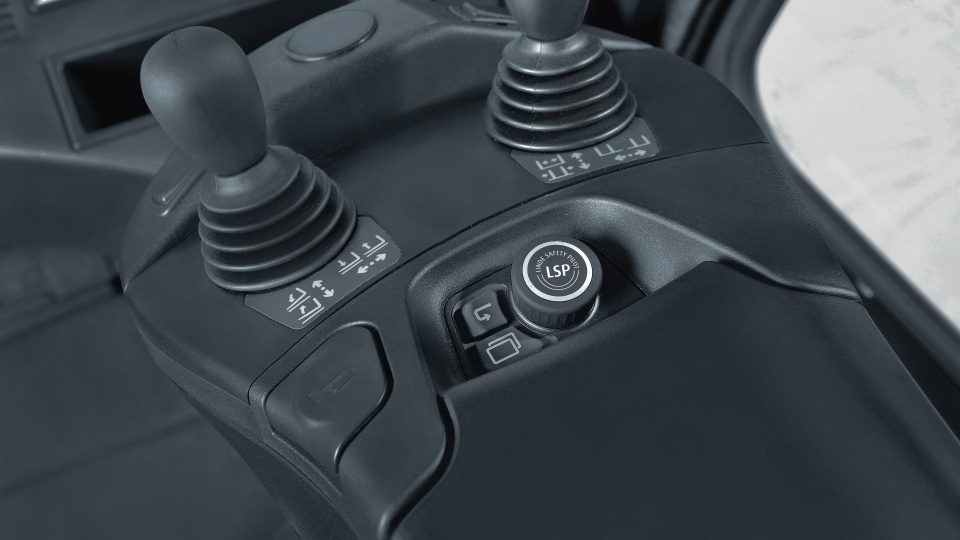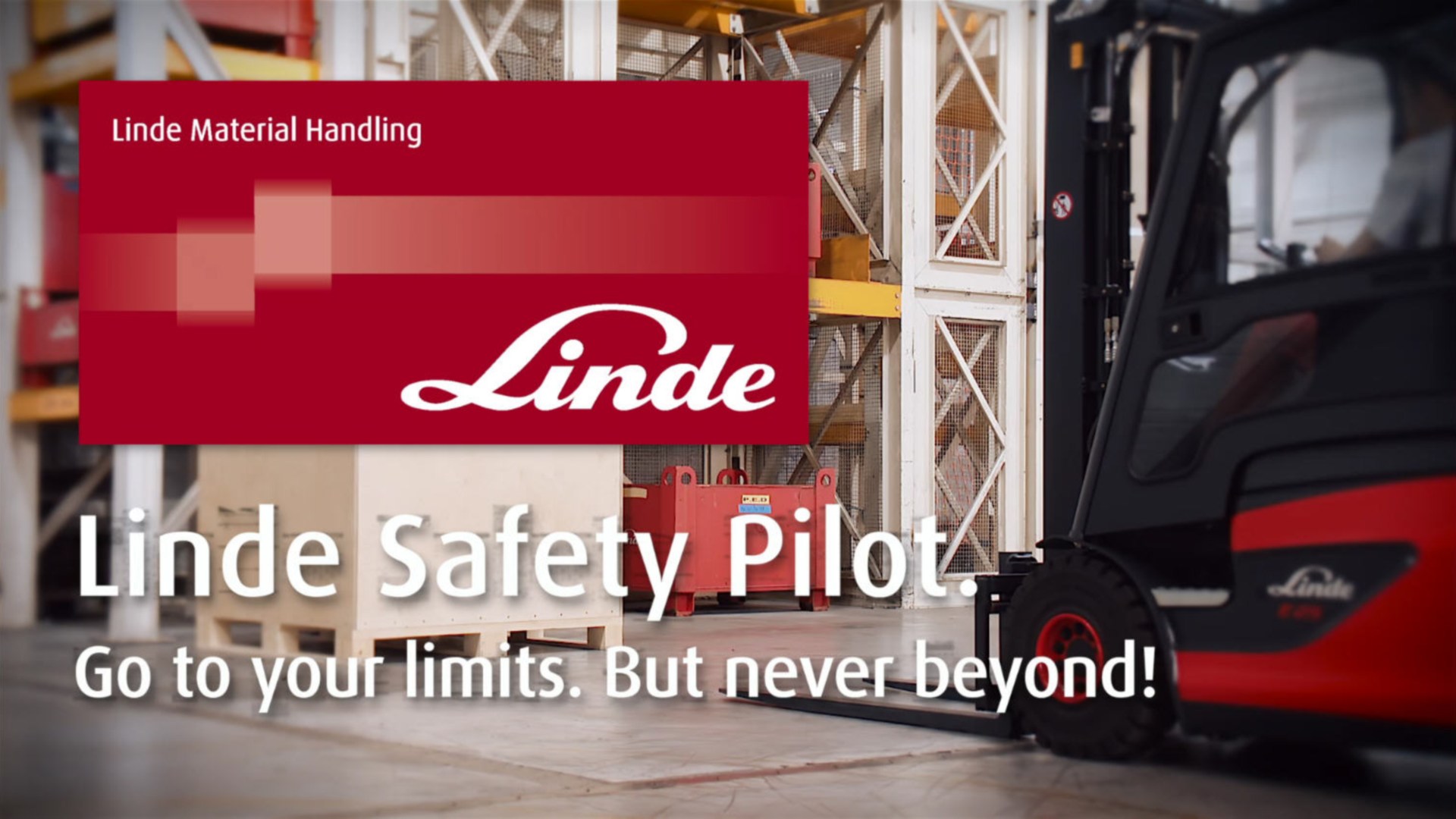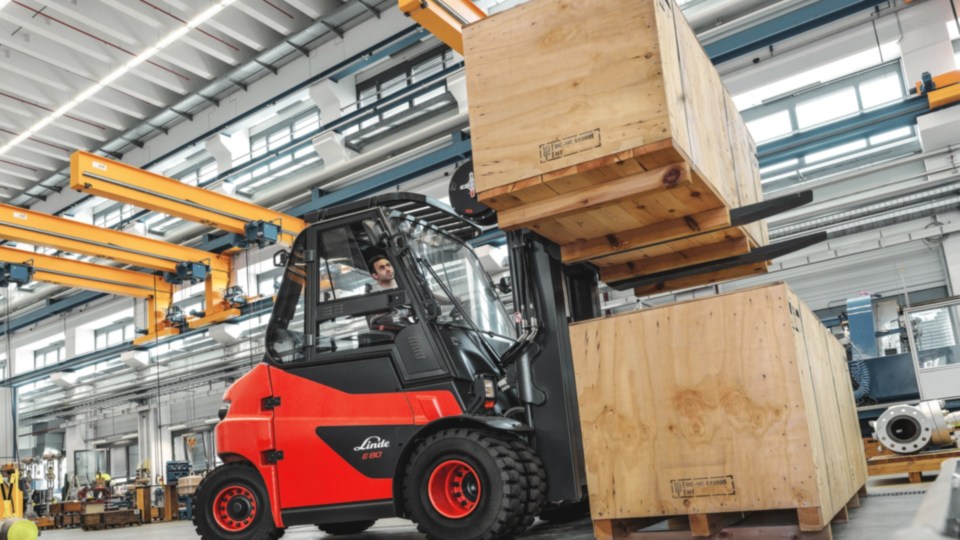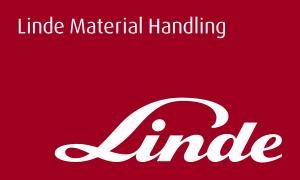Preventing tipping accidents
LINDE SAFETY PILOT
Preventing tipping accidents
LINDE SAFETY PILOT
An intelligent passenger increasing safety
Counterbalance forklift trucks rarely tip over, but when it happens, it can endanger the driver’s life and cause significant damage to the truck and the load. It’s generally caused by driver error. In order to reduce ‘human error’, Linde has developed an unique driver assistance system, setting new standards when it comes to safety. The Linde Safety Pilot (LSP) functions like an intelligent passenger and is available in two versions, LSP Select and LSP Active. In both versions, the driver can always see key parameters displayed on a small monitor. If the driving status of the truck becomes critical, warning colors appear on the monitor, and it emits a warning signal. The Active version of the Linde Safety Pilot automatically intervenes in the forklift truck’s driving and lifting functions.

Don’t leave it up to instinct
Tipping over a counterbalance forklift truck is dangerous; the driver can be severely injured and the cargo damaged. It’s not easy for the driver to stop the truck from tipping over, particularly if different, unknown loads are regularly being transported. To guarantee their safety, the driver would have to know and be able to precisely assess the load weight, the load center distance, and the required lift height. That is not realistic. In practice, it often comes down to instinct. In both the Active and Select versions, the LSP has a range of sensors that measure data such as lift height, tilt angle, and load weight at various locations on the truck. These key values are displayed on a monitor in the driver’s cabin. The driver no longer has to guess the weight of the transported goods or the current lift height, but can now use them to keep an eye on the level of danger.



Safety
Dangerous accidents involving counterbalance forklift trucks tipping over are significantly less likely using the Linde Safety Pilot.

INNOVATIONS INCREASING SAFETY
Load weight
A highly sensitive sensor measures the pressure in the lift mast’s hydraulics. Using known values such as the cylinder diameter and lifting chain gear ratio, the current load weight can be calculated.
Tilt angle
The accompanying sensors are integrated as standard in all Linde counterbalance forklift trucks.
Lift height
A specially developed cable length indicator integrated into the lift mast is used for this purpose.
Load torque (LSP Active only)
On the rear axle, there is a newly developed measuring cell that can be used to calculate the load torque or the load center distance to the front axle.



The LSP monitor displays three versions
- Safer working area: There are no restrictions.
- Threshold: The display lights up orange; this means the payload threshold has almost been reached. LSP Active reduces the tilt speed when lifting.
- Critical area: The display lights up red; this means the payload limit has been reached. A warning signal also sounds. LSP Active adjusts the truck’s functions.

Active intervention in driving
LSP Active also provides additional support to the driver in the form of an active assistance system: If they use their counterbalance forklift truck to lift a heavy load that is on the weight limit, the system emits visual and acoustic signals and slows down the lifting or tilting movement. If the driver doesn’t react, the truck’s lifting motion is stopped completely. The same thing happens when driving. If the driver accelerates the loaded forklift truck too rapidly, brakes too sharply, or goes round corners too quickly, LSP Active intervenes in the driving function. The system compensates for driver error and prevents the truck from tipping over in most cases.
Work faster and more safely using the convenience functions
The Select and Active versions also have numerous convenience functions, from pre-selecting the lift height using integrated load scales, to pre-setting speed limits. This makes operating processes safer and more productive. For example, before a journey, the driver can set the height the goods should be lifted to. Adjustments no longer need to be made during handling, saving time. The integrated load scales weigh the goods in seconds and also contain an addition function. For example, the driver can quickly detect if a truck’s maximum load capacity has been reached. An adjustable lift height and lowering threshold (fork wear and tear protection) help eliminate damage and accidents in advance. This means that low warehouse ceilings or uneven floors no longer present a danger.

COMPARING LSP SELECT AND LSP ACTIVE
Displays on the monitor
LSP Select
- Load, lift height, tilt angle, driving speed, steering angle, pre-selected direction of travel (2 pedals / 1 pedal), drive temperature
LSP Active
- Load, lift height, tilt angle, driving speed, steering angle, pre-selected direction of travel (2 pedals / 1 pedal), drive temperature
- plus display of current maximum permitted lift height, load center distance, current maximum permitted tilt angle.
Active intervention
LSP Select
- not available
LSP Active
- depends on lift height, tilt angle, and driving speed (based on driving or load status, etc.)
Convenience functions
LSP Select
- Lift height pre-selection, tilt angle pre-selection, lowering threshold (fork wear and tear protection), load scales (with tare function), load calculation, truck dynamics setting, energy consumption display, speed limit.
LSP Active
- Lift height pre-selection, tilt angle pre-selection, lowering threshold (fork wear and tear protection), load scales (with tare function), load calculation, truck dynamics setting, energy consumption display, speed limit.

How does a forklift truck tip over?
1.?The driver picks up the load using the forklift.
2.?They drive the forklift with the load lifted.
3.?If the driver brakes with the load lifted, the forklift truck starts to tip over.
4.?The truck tips over.



